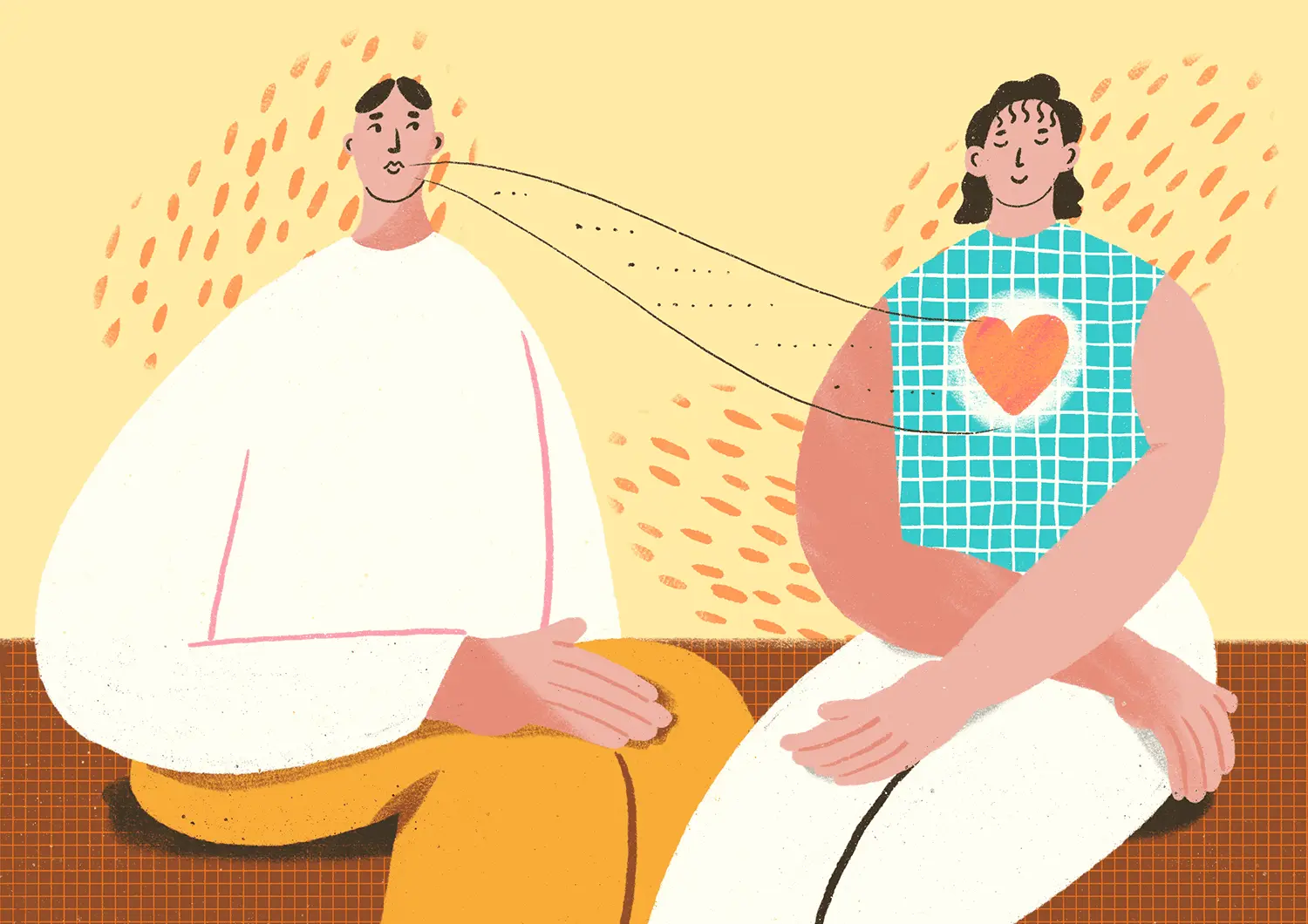Recently, the masterpiece "Chungking Express" emerges anew, its 4K restoration gracing the silver screen. Tony Leung and Faye Wong, Brigitte Lin and Takeshi Kaneshiro, interweave a tapestry of love's solitude and ethereal dance, of wild ardor and tender romance. Amidst this cinematic symphony, He Qiwu (played by Takeshi Kaneshiro) utters with poetic grace:
"We split up on April Fool's Day.
So I decided to let the joke run for a month.
Every day I buy a can of pineapple with a sell-by date of May 1.
May loves pineapple, and May 1 is my birthday.
If May hasn't changed her mind by the time I've bought thirty cans,
then our love will also expire."
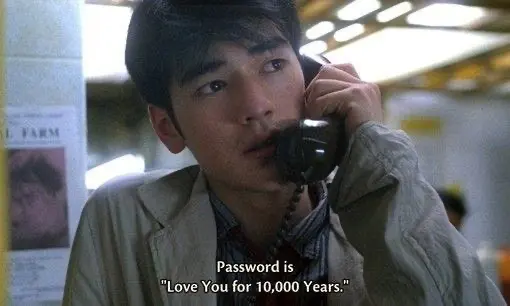
Film still from "Chungking Express"
Because of love, we find joy and contentment amidst the toughest of days. Because of love, our hearts can ache even under the sun's radiant gaze. Some deem love an essential need, while others cherish the tranquil solace of solitude.
Yet, perchance we all concur, when love comes knocking, the world transforms in an instant. It is as if your mind, a conductor immersed, orchestrates diverse fragments, igniting an alchemy of chemistry, unfurling a serenade of love's melody.
When You're in Love, What Happens in Your Brain?
When we fall in love, it is usually divided into different stages. During the phase of lust and attraction, the activity in the ventral tegmental area (VTA) of the brain increases. The VTA is a central region in the brain that processes rewards and motivations. For instance, when someone offers you a dessert or quenches your thirst, the activity in the VTA increases. Its activation triggers the release of dopamine, a neurotransmitter that produces a pleasant sensation. This teaches the brain to anticipate receiving the same reward by repeating the associated behaviors. During this phase, various chemicals flow abundantly within the brain, leading to different physical and emotional responses. These may include accelerated heart rate, sweaty palms, blushing, heightened energy, and sometimes feelings of anxiety due to increased cortisol levels. It can even make falling asleep difficult.
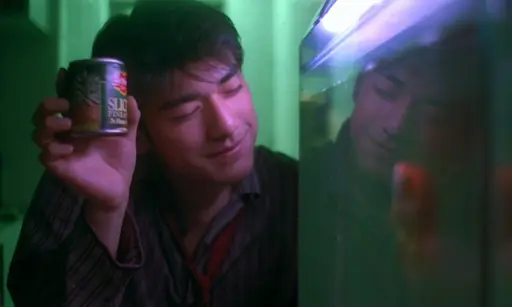
Film still from "Chungking Express"
Psychologist Helen Fisher believes that love is composed of three emotion systems: lust, attachment, and attraction. The brain's testosterone and estrogen drive our desires and lustful feelings. Oxytocin and vasopressin solidify our attachment to our loved ones. Dopamine, norepinephrine, and serotonin increase the attractiveness of our romantic partners in our eyes.
Psychologist Robert Sternberg's "Triangular Theory of Love" states that Consummate Love, the ideal form of love, is composed of intimacy, passion, and commitment. Intimacy refers to feelings of closeness and connection, creating warmth through genuine bonding. Passion encompasses romantic feelings, physical attraction, and sexual desire. Commitment represents the decision to love someone and the willingness to make sacrifices to maintain that love.
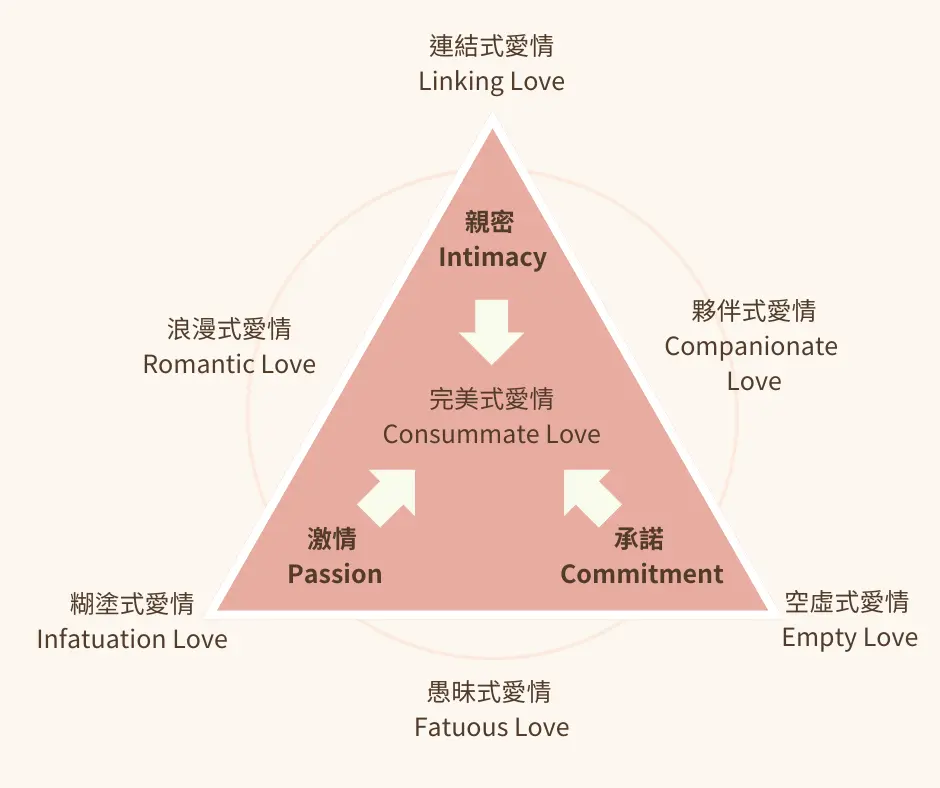
In different types of romantic relationships, the configuration of the love triangle can vary. For example, a relationship centered around passion and intimacy is likely to be categorized as romantic love. A relationship focused on intimacy and commitment may be classified as companionate love. On the other hand, if a relationship only consists of passion without the other components, it could be described as infatuation love. The proportions of the love triangle components in each relationship are likely to change over time and with different experiences and ways of relating. They can either strengthen or diminish.
The Science Behind Being Lovestruck
When people are deeply in the throes of love, it's not uncommon for them to exhibit a noticeable dip in activity in the prefrontal cortex region of the brain. This area is crucial for critical thinking and sound judgment. As a result, many love-struck individuals find their decision-making faculties diminished compared to before they fell head-over-heels. This phenomenon of reduced rationality during the infatuated stages of a relationship is often referred to as the "love-struck brain".
As the phase of lust and attraction subsides, the levels of stress hormones such as cortisol and serotonin return to normal. Relationships generally progress to a more stable stage known as the attachment phase. During this phase, two hormones, oxytocin and vasopressin, play a role in conveying trust, support, attachment, and a sense of calm. They contribute to the bonding of familial and friendly relationships. Oxytocin, in particular, helps inhibit the release of stress hormones. Over time, as we gain a deeper understanding of our partner, we become more familiar with their true selves through communication and shared experiences. This familiarity allows for a greater sense of relaxation and authenticity in our interactions, fostering sincere and profound understanding.
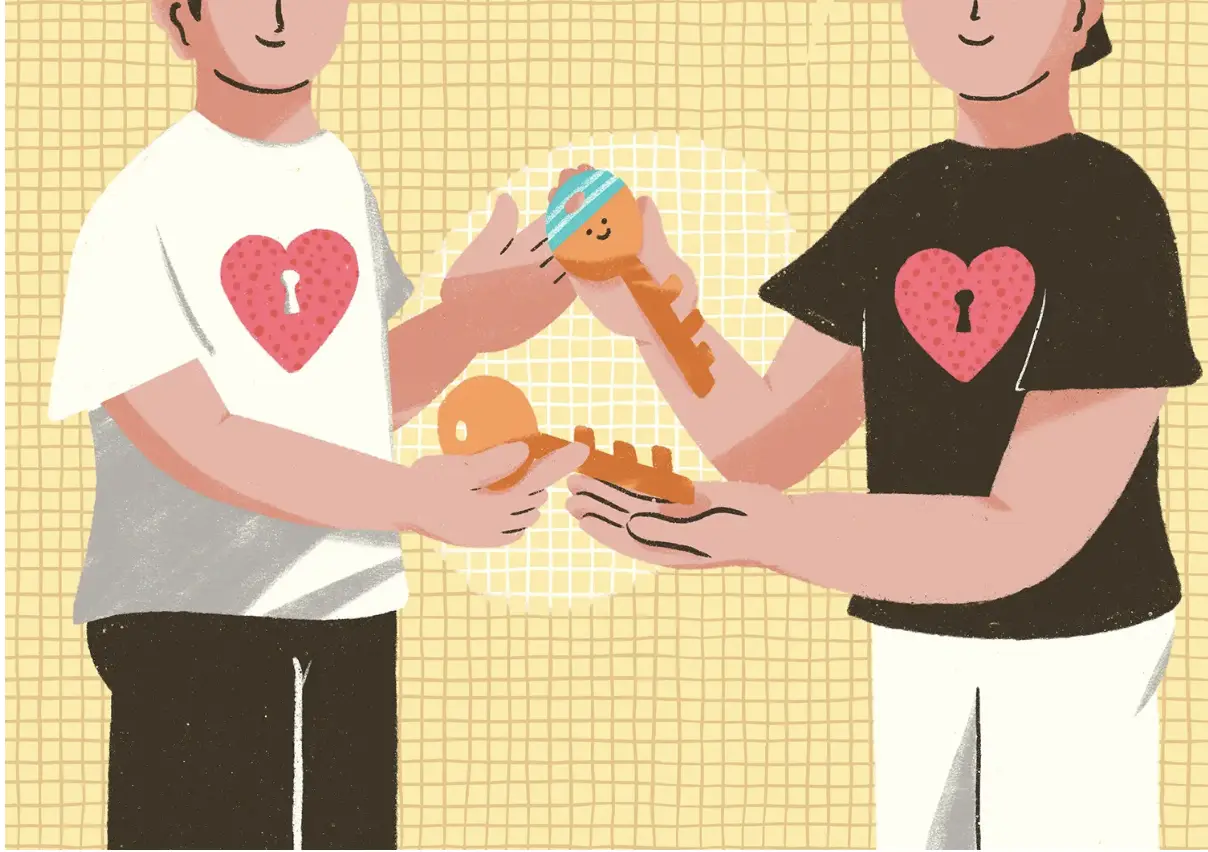
The Pain of a Breakup
As time goes by, the "rosy filter" of lust and attraction may lose its effect, revealing conflicts or issues within the relationship. Some romantic relationships end for various reasons, and the pain of a breakup activates the insular cortex in the brain, which processes pain, including physical pain such as an injury and psychological pain such as feeling excluded. After a breakup, some individuals yearn to stay connected with their ex-partner. Studies show that participants who experienced an unwilling breakup exhibit increased activity in the ventral tegmental area (VTA) when they see photos of their ex-partner (as mentioned earlier, the brain's center for processing rewards and motivation). This can also activate the body's stress alarm system, leading to feelings of restlessness and anxiety.
Fortunately, the brain has its allies to help navigate the lows of heartbreak. The activity in the prefrontal cortex, responsible for reasoning, emotion regulation, and impulse control, increases, assisting in blocking signals of grief and longing. However, during adolescence, this brain region is still developing and not fully matured, which may explain why many people feel that breakups during their youth are particularly profound and challenging to endure.
Practicing Self-Care During Heartbreak
When saying goodbye to a romantic relationship, we can appreciate the beautiful memories of the past, but it's important not to excessively dwell on them. Reducing the things that make you look back and decreasing nostalgic feelings can make it easier for you to move forward. Engaging in exercise, listening to favorite songs, spending time with friends, and cultivating new interests can release dopamine in the brain, which helps reduce the stress response during a breakup.
We can also try to learn not to be overly attached to a relationship or a person. Perhaps we all hope to have someone who tells us that we are special, loved, and valuable. However, we don't have to define ourselves based on a relationship or rely on a relationship to fulfill ourselves. By shifting the focus back to ourselves, cultivating self-care, and exploring our needs in relationships, we can understand our deep-seated needs and find ways to fulfill them. It could be emotional needs such as support and companionship, or a sense of belonging to oneself. Although the desire for intimate relationships is inherent in human nature, we must remember our own strength and our ability to love ourselves.
In "Chungking Express", there is a classic dialogue:
"Somehow everything comes with an expiry date.
Swordfish expires. Meat sauce expires.
Even cling-film expires.
Is there anything in the world which doesn't?"
Maybe you and I have both experienced similar feelings in different relationships. However, research conducted on couples with over 21 years of marriage and a good relationship involved functional magnetic resonance imaging (fMRI). The results showed that when participants saw pictures of their partners, dopamine-related areas of the brain, such as the ventral tegmental area (VTA), were activated to a similar extent as in couples in the passionate love stage. This suggests that even after the initial passionate love phase has passed, mature attachment and long-lasting emotional connection can still bring us immense joy.
Further research indicates that a specific part of the globus pallidus in the brain may only be activated by long-term love that includes friendship, rather than by lust or sexuality. The globus pallidus contains oxytocin and vasopressin, which help solidify trust, sense of support, and maintain loyalty in the companionship of everyday life. In romantic relationships, viewing your partner as a close friend or companion in personal growth is the key to a lasting and fulfilling relationship. As renowned love researcher Helen Fisher puts it, "Play with somebody, stay with somebody." Engaging in enjoyable activities with your partner can ignite the dopamine system and create a sense of focus and positive inspiration. Fisher also shares other methods for maintaining long-term romantic relationships, such as trying novel activities together to release dopamine (such as exploring new restaurants or cultivating new interests), expressing empathy towards your partner, and showing kindness (such as acknowledging their efforts and hard work), which can help reduce cortisol levels and boost the immune system.
Through the language of science, a profound truth emerges: when you dedicate yourself to tending the garden of love and encounter a kindred soul who reciprocates with unwavering tenderness and patient devotion, a wondrous love symphony is born.
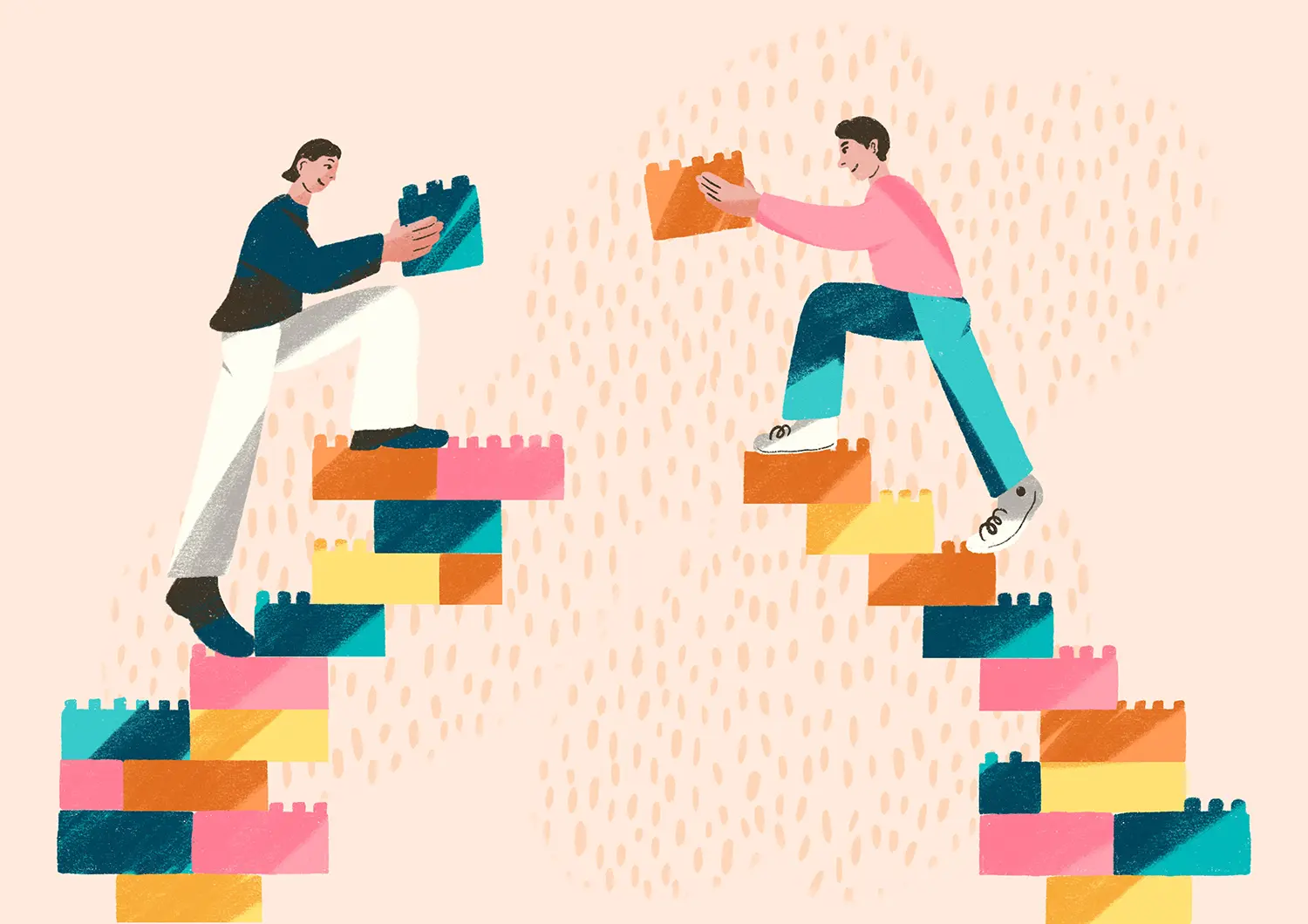
References:
Acevedo, B. P., Aron, A., Fisher, H. E., & Brown, L. L. (2012). Neural correlates of long-term intense romantic love. Social cognitive and affective neuroscience, 7(2), 145–159. https://doi.org/10.1093/scan/nsq092
Fisher, H., Aron, A., & Brown, L. L. (2005). Romantic love: an fMRI study of a neural mechanism for mate choice. The Journal of comparative neurology, 493(1), 58–62. https://doi.org/10.1002/cne.20772
Sternberg, R. J. (1986). A triangular theory of love. Psychological Review, 93(2), 119–135. https://doi.org/10.1037/0033-295X.93.2.119
Sbarra, D., Smith, H., & Mehl, M. (2012). When Leaving Your Ex, Love Yourself: Observational Ratings of Self-Compassion Predict the Course of Emotional Recovery Following Marital Separation. Psychological Science, 23 (3), 261-269. https://self-compassion.org/wp-content/uploads/publications/Sbarra.pdf
Brody, N., LeFebvre, L., & Blackburn, K. (2020). Holding on and letting go: Memory, nostalgia, and effects of virtual possession management practices on post-breakup adjustment. Journal of Social and Personal Relationships, 37(7), 2229–2249. https://doi.org/10.1177/0265407520921460
Scott Edwards. (2015). Love and the Brain. Harvard Medical School. Retrieved from https://hms.harvard.edu/news-events/publications-archive/brain/love-brain
Shannon Odell. (2022). The science of falling in love. TED-Ed. Retrieved from https://www.youtube.com/watch?v=f_OPjYQovAE


